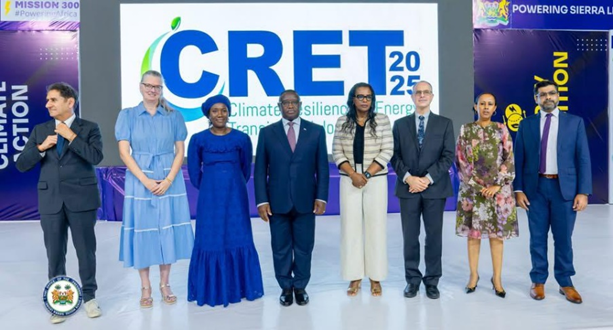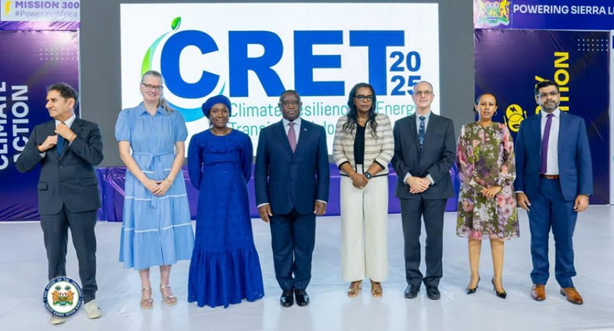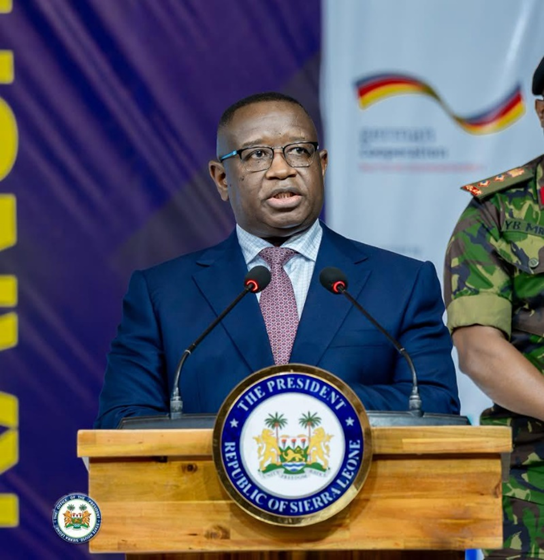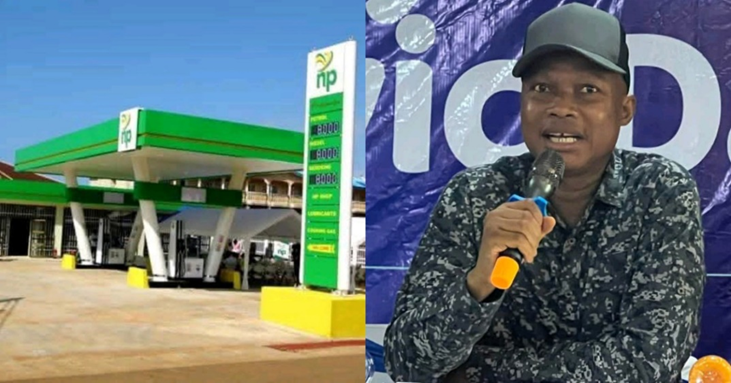By Mackie M. Jalloh
Sierra Leone has placed itself firmly at the center of Africa’s clean energy transformation, with President Dr. Julius Maada Bio outlining an ambitious plan to drive renewable energy expansion, climate resilience, and food security at the third edition of the Climate Resilience and Energy Transition Dialogue (CRET 2025).
The landmark dialogue — convened by the Presidential Initiative on Climate Change, Renewable Energy, and Food Security (PI-CREF) — brought together global leaders, development partners, private investors, and civil society to explore pathways toward sustainable development. Held under the theme “Mobilizing Investments for Climate Action, Food Security, Clean Cooking, and a Just Energy Transition for All,” this year’s forum marked a decisive moment for Sierra Leone’s climate and energy ambitions.
In his opening keynote, President Julius Maada Bio reaffirmed his government’s commitment to a practical, inclusive, and people-centered energy transition. He emphasized that Sierra Leone’s approach goes beyond rhetoric — it is about turning ambition into measurable results.
“When we initiated the Climate Resilience and Energy Transition Dialogue in 2023,” President Bio said, “our goal was to move beyond declarations and translate our ambitions into actions that deliver results for our people.”
The president recalled the launch of the Energy Transition and Green Growth Plan — a comprehensive framework guiding the country’s shift toward sustainable energy and climate resilience. He noted that the plan has now moved from vision to implementation, with tangible progress being made across multiple sectors.
Among the highlights of his announcement was the 20-megawatt solar power plant at Kibibi in Kamakuli and the Regional Emergency Solar Intervention Project (RESPITE) — a 40-megawatt solar energy project with battery storage. Scheduled for commissioning by 2026, RESPITE will be deployed across two key areas: 30 megawatts in Eugene and 10 megawatts in Long Bay.
“These projects demonstrate that our energy transition is deliberate, systematic, and centered on our people,” he declared. “We are reforming governance structures, improving transparency, and reducing technical and commercial losses across the power grid.”

At the heart of President Bio’s address was Mission 300, Sierra Leone’s flagship clean energy initiative that aligns with the African Union’s goal of connecting 300 million people to electricity by 2030. The president described Mission 300 as the country’s most comprehensive and transformative investment blueprint for the energy sector.
He revealed that Sierra Leone’s National Mission 300 Compact — endorsed in September — will connect over 720,000 new households through a mix of grid expansion and renewable mini-grid solutions. “This milestone confirms that our institutions are credible and capable, and that our national vision for energy security is achievable,” President Bio affirmed.
To ensure that rural communities are not left behind, the government is also establishing a Wealth Electrification Agency — tasked with providing off-grid energy solutions to 560,000 households by 2025.
The president used the platform to highlight Sierra Leone’s growing leadership in clean cooking and energy access, stressing the importance of protecting forests, improving public health, and empowering women economically.
“Our National Clean Cooking Strategy and the ECOWAS LPG 2020 Program show our commitment to cleaner, safer, and more sustainable energy solutions,” he said. “Expanding access to clean cooking fuels is not just about energy — it’s about dignity, health, and opportunity for our women.”
He commended Roslyn, a prominent advocate for women’s energy access, for her steadfast leadership in advancing gender-focused energy policies.

Additionally, President Bio announced the establishment of a Climate Finance Unit within the Ministry of Finance, a move designed to improve coordination, transparency, and resource mobilization for national energy and climate programs.
As Chair of ECOWAS, President Bio underscored Sierra Leone’s active role in strengthening regional energy cooperation through the West African Power Pool (WAPP) and the CLSG Interconnection Project — a partnership with Côte d’Ivoire and Guinea to enhance electricity trade and regional integration.
Beyond energy, the president connected climate action to food security and economic stability. He highlighted the Fifth Summer Initiative, a bold agricultural reform effort focused on climate-smart farming. “We are modernizing agriculture, improving resilience, and expanding opportunities for farmers and agribusinesses,” he said, noting that food import dependency has dropped and inflation in food prices is decreasing.
A forthcoming Policy for Agricultural Rights for Climate-Smart Agriculture will further provide affordable credit for farmers, especially women and youth, to sustain livelihoods amid climate change.
The event featured high-profile contributions from Sierra Leone’s key development partners.
Hon. Dr. Kandeh Kolleh Yumkella, Chairman of PI-CREF, emphasized that the dialogue reflects Sierra Leone’s evolution from planning to action. “Energy transition requires continuity, leadership, and patience,” he said, commending President Bio’s personal involvement in attracting top-tier investors and institutions like the World Bank and African Development Bank (AfDB).
Representing the AfDB, Ms. Halima Hashi, Country Manager for Sierra Leone, reaffirmed the bank’s $208 million investment portfolio across energy, agriculture, and infrastructure. “Through the CRET dialogue, Sierra Leone has become a strong voice for a just and inclusive energy transition,” she said. “Our support for Mission 300 and renewable expansion remains unwavering.”
Dr. Dymphna van der Lans, CEO of the Clean Cooking Alliance (CCA), hailed Sierra Leone’s clean cooking efforts as “historic.” She praised the launch of the National Clean Cooking Strategy under Sheryl Yates, describing it as “a groundbreaking step that combines climate action with gender equality and public health.”
She reiterated CCA’s commitment to helping Sierra Leone reach 25% of households with clean fuels by 2030 and universal urban access by 2040.
Meanwhile, Mr. Abdu Muwonge, Country Manager of the World Bank, reaffirmed the Bank’s partnership in supporting an 80-megawatt renewable project by 2027, strengthening climate resilience and energy access nationwide.
In his closing remarks, President Bio called for unity and shared responsibility in advancing Africa’s climate agenda. “Let us move forward with purpose and optimism,” he urged. “Every investment must drive progress; every action must lead to resilience and shared prosperity.”
He also acknowledged Dr. Jaime León-Guevara, Chairman of ICREP and Secretary of Energy and Sector Coordination, for his leadership in steering energy and climate initiatives.
The event concluded with a ceremonial launch of new initiatives, led by President Bio alongside Hon. Sheku A.F. Bangura (Minister of Finance), Dr. Henry Musa Kpaka (Minister of Agriculture and Food Security), Abdu Muwonge (World Bank), Halima Hashi (AfDB), Dr. Dymphna van der Lans (CCA), and Jacek Jankowski (Head of EU Delegation to Sierra Leone) — signaling deepening multilateral commitment to Sierra Leone’s energy and climate transformation.
Through CRET 2025, Sierra Leone has not only renewed its national agenda for climate resilience and clean energy but also cemented its reputation as a continental leader driving Africa’s green revolution — one community, one project, and one partnership at a time.



